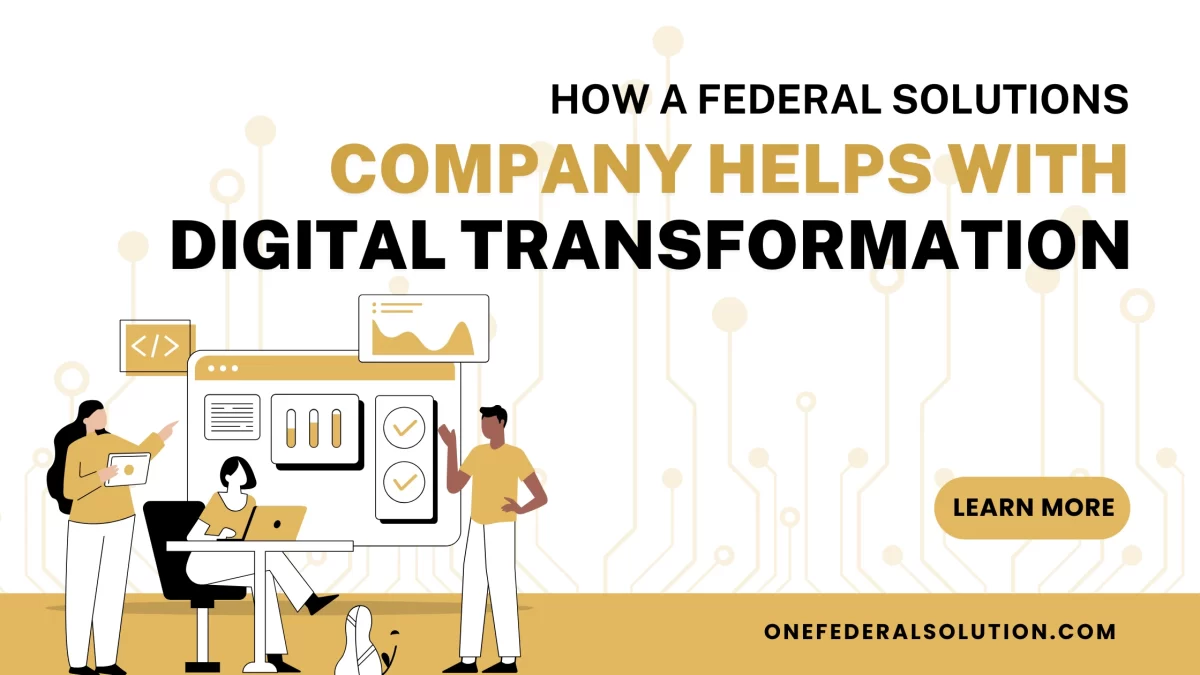Every organization today needs to adapt to this ever-evolving digital landscape. Numerous small businesses have adopted digital transformation to enhance their efficiency and customer service. It is quite common to see them using cloud computing, CRM, AI, and machine learning tools.
However, the pace of digital transformation adoption often differs significantly in the government sector.
Many federal agencies are not technologically advanced compared to their private counterparts. They still rely on outdated systems and processes. Examples include the Internal Revenue Service or IRS has one-third of its applications and computer programs running on outdated systems—25 years or older.
But that doesn’t mean these federal agencies don’t want to go digital. A complete overhaul requires substantial time and effort. Thanks to the complexity of their legacy systems and the lack of comprehensive employee training. This leads them to specialized federal solution companies to meet their complex digital requirements.
A federal solution company provides technological solutions such as cloud computing, big data analysis, cybersecurity, consultation, and IT support. This way, government agencies can make the most of technology to enhance and streamline their operations despite having limited in-house infrastructure and resources.
While there are many federal solution agencies around, it is important to choose the right one. Here is a rundown of factors defining a true federal solution company in the modern digital landscape.
The Unique Role of a Federal Solution Company
A federal solution company works with all types of government agencies—from local to state governments and large federal departments. They provide government IT solutions designed to handle complex, large, and often highly secure operations.
These providers should understand the bureaucratic processes, procurement systems, and compliance standards required to operate in the public sector. Not only they are responsible for delivering tech, but also ensure trust, accountability, and mission-driven results.
Key Features That Define a True Federal Solutions Provider
1. Mission Understanding and Alignment
Given the critical nature of any federal agency, the role of a federal solution company becomes important. Their role is just more than being a vendor. They are their partner in public service, although it doesn’t play any active role. For example, a federal solution agency can help a public health department digitalize the patient’s record. It helps the department learn the pattern of health conditions and treatments.
2. Expertise in Government IT Solutions
Federal agencies have their fair share of challenges when it comes to adapting technology. Thanks to outdated legacy systems, huge piles of data, and strict compliance regulations.
A true government IT solutions vendor offers scalable, robust, and secure solutions such as cloud migration, legacy system modernization, workflow automation, AI and machine learning solutions, and secure data storage and analytics.
Being able to implement and manage these systems efficiently is a core expectation from a true federal partner.
3. Focus on Digital Transformation for Federal Agencies
Integrating federal services with technology is not just installing new software. The agency should know how the public sector works as well as the associated challenges to address. Technology should be easy to use and scalable for people at both ends. It should enable better decision-making, policy implementation, and service delivery.
A legitimate Federal solution company leads digital transformation for federal agencies, helping them:
- Improve citizen services
- Reduce operational costs
- Enhance inter-agency collaboration
- Move toward paperless, data-driven models
4. Strong Federal Technology Services Portfolio
A reliable federal solution company often has a comprehensive set of services to tackle the unique needs of their clients. These services can be:
- Cloud services
- DevSecOps and agile development
- Enterprise architecture
- Network modernization
- Business intelligence and reporting tools
With end-to-end solutions, agencies can assure their clients that they are working with an experienced player who can meet all requirements.
5. Expertise as a Federal Systems Integrator
For successful federal projects, multiple platforms, tools, and technologies should work in sync. This is what a good federal system integrator makes possible.
Whether integrating legacy systems with modern applications or coordinating between multiple vendors, the systems integrator ensures the whole solution functions smoothly as one unit.
6. Emphasis on Federal Cybersecurity Solutions
Security is a highly critical factor in the public sector. Over the years, legacy systems and outdated applications have made the public sector vulnerable to cybercrimes. The lack of robust cybersecurity can be addressed with a reliable federal cybersecurity provider.
They must proactively address:
- Network vulnerabilities
- Endpoint protection
- Data encryption
- Identity and access management
- Continuous monitoring and threat detection
With increasing cyberattacks on public infrastructure, cybersecurity isn’t optional — it’s mission-critical.
7. Commitment to Government Digital Services
Today’s citizens expect government services to be digitally convenient. A good federal solution company can help with
- Online portals and self-service tools
- Digital forms and e-signatures
- Mobile apps for public access
- Chatbots and virtual assistants
A forward-thinking federal solution company helps agencies deliver these experiences, making government services more accessible, efficient, and transparent.
8. Compliance and Certifications
Government projects cannot be assigned to agencies lacking credentials and verifications. A real federal partner holds necessary certifications and follows strict compliance requirements, such as:
- ISO certifications
- CMMI levels
- FedRAMP authorization
- GSA Schedule listings
- Clearance and background check protocols
Innovation: The Heart of a Modern Federal Partner
Today, innovation separates the leaders from the followers. A Federal solution company must keep up with emerging technologies such as:
- Artificial Intelligence
- Blockchain for record-keeping
- 5G and edge computing
- Quantum encryption
- Predictive analytics
Agencies are actively looking for forward-thinking partners who can help them plan for the future, not just patch the present.
Collaboration and Communication
A true Federal systems integrator doesn’t just work behind the scenes. They maintain open lines of communication with stakeholders, including procurement officers, project managers, and agency leadership. Transparency, clear documentation, and collaborative progress tracking are essential to ensuring project success.
Why It Matters Now More Than Ever
As digital needs evolve, government agencies need a vendor who can offer more than “tech”. They need partners who can align with their missions, ensure compliance, remain transparent, and drive real change.
That’s why defining a true federal solutions company is more important now than ever before.
From natural disasters to national security, federal agencies need agile, secure, and mission-aligned support. These companies must be able to respond quickly, scale efficiently, and anticipate future needs.
If you are looking for a federal solution agency ticking all the boxes, look no further than One Federal Solutions. We are a leading provider of government and commercial solutions, including software implementation, cybersecurity, data analytics, staff augmentation, and more. Let us know how we can help you!































